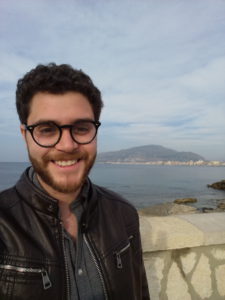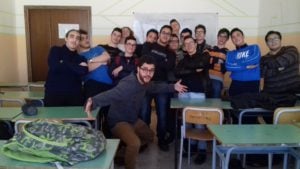Abbiamo intervistato Alex Lotito in merito alla sua esperienza di Fulbright ETA (English Teaching Assistant) a Trapani. Here’s what he told us!

1) What brought you to your city/university/school in Italy? How long have you been here?
I have been in Trapani since mid-September. Before applying to the Fulbright, I worked as a High School teacher in North St. Louis for a couple of years with Teach for America. During my time in St. Louis, I developed a curriculum focusing on representations of crime in Italian Literature and Film as a paradigm for considering how violence is represented in American literature, music, and media. I applied for a Fulbright in Italy and feel very fortunate to be placed in Trapani.
2) Had you ever been in the South of Italy before?
Prior to this experience, I had visited Italy, but I had never been in the South or in Sicily. I had been to Florence, Rome, and briefly Milan on family vacations. I had heard of the great differences between the South and North and have enjoyed the peculiarities and idiosyncrasies the South has to offer.
3) How do you like your experience so far?
The experience so far has been great. I’ve found the students I work with to be a lot of fun. Many are dedicated to their studies and determined to improve their English. As a teacher, it has been a privilege to work with so many kids who are so self-motivated. In addition, working with multiple teachers has given me the opportunity to consider new ways of managing a classroom and designing activities. Finally, life outside of the classroom is relaxing and I have found many new friends in the community.
4) What’s one thing that may have surprised you about the habits and customs of the Italians you’ve come in contact with?
In classes, students and I have discussed stereotypes of Italians and Americans. As far as Italian culture goes, some of these stereotypes are often true, such as the fascination for so many people with food or a cult like obsession with soccer. One thing that has surprised me, however, has the been the particularity of Italian culture. I’ve noticed that many people have their way of doing things and are not so open to trying new things. For example, the grocery stores here have little more than Italian products. People’s daily rituals seem to synchronize in a way that I have not observed anywhere else. In some ways, these uniform habits or customs makes Italian culture strong. It is a culture that is self-aware and proud. At times, however, I wonder what sorts of changes might occur if people were more open to other cultural influences.

